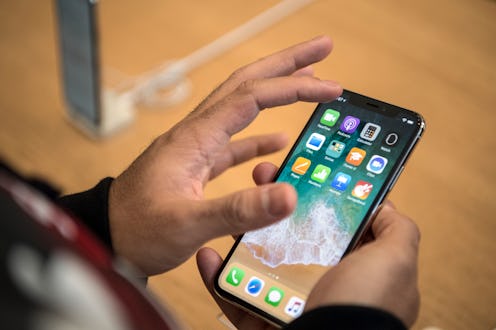Life
The One Reason You Might Not Want To Use Apple’s New Battery Health Setting

After news broke in December 2017 confirming a longtime conspiracy theory that alleged Apple intentionally throttled the power on older iPhones, Apple CEO Tim Cook said in the future, users would be able to choose performance or longer battery lifetime, according to The Verge. And, well, that future is now: iOS 11.3 offers a battery performance management setting in the operating system's brand-new Battery Health section that will allow you to turn off all power throttling. For those of us who have experienced a slowdown on our older iPhones, this option may seem like a dream come true. But there's a pretty significant reason you may not want to turn off battery performance management once your iPhone has updated.
According to Apple's press release about 11.3, the power management feature "dynamically manages maximum performance to prevent unexpected shutdowns." This is essentially the feature Apple has been using since iOS 10.2.1 on iPhone 6, 6S, and SE, and iOS 11.2 on iPhone 7. If your battery is degraded, the power management system kicks in and throttles your phone's performance in order to help prolong the lithium-ion battery's lifetime.
That means if you choose to disable power management in 11.3, you're risking your phone unexpectedly shutting down if your battery is unable to handle the performance load. As Quartz explained, turning off power management could also mean "it'll take longer for apps to load, the speakers may be quieter, and the camera flash may even be disabled in some cases." If you're willing to risk these side effects (plus, of course, shorter overall battery lifetime) by turning off power management, "[i]t's a trade-off you'll have to make for a longer battery life," Quartz reported. Bustle has reached out to Apple for comment, and we will update this article when we hear back.
If you're checking out the Battery Health section on your iPhone right now and wondering if your update somehow glitched because you're not seeing an option to turn off power throttling, don't worry — that means your phone has determined your battery is still healthy enough to allow your phone to operate at peak performance without shortening the battery's lifetime. Throttling only happens when a phone's battery is compromised.
However, if you've experienced battery-related issues, like random shutdowns or noticeably shorter time between charges, you're likely to see an option to disable Peak Performance Capability, with an explanation that says, "This iPhone has experienced an unexpected shutdown because the battery was unable to deliver the necessary peak power. Performance management has been applied to prevent this from happening again," according to Quartz.
Shutting off throttling is entirely up to you. Whether or not you were miffed by Apple's decision to throttle older phones' power without notifying users, you may just want your phone back to its like-new performance capabilities, and that's understandable. But you should be aware of the risks — e.g., having your phone randomly shut down — going in.
Apple is putting this feature into consumers' hands after complaints that the tech giant hadn't been upfront with users about what it was doing to their old phones, even if Apple claimed slowing down phones was done in an effort to prolong battery lives and allow users to keep their older iPhones longer. Apple denied that it slows down older phones in order to get users to purchase newer models, according to CNET. December's revelations led Apple to formally apologize and offer $29 battery replacement for iPhone 6 and later models, CNET reported.
"We’ve been hearing feedback from our customers about the way we handle performance for iPhones with older batteries and how we have communicated that process," Apple said in its December statement. "We know that some of you feel Apple has let you down. We apologize."
Apple explained that its phones' lithium-ion batteries "are consumable components that become less effective as they chemically age and their ability to hold a charge diminishes." While time and charges factor into a battery's aging, device use is a big part of that too, the company said, and throttling devices was in effort to prevent shutdowns and extend battery lifetimes. It looks like from here on out, though, users will be the ones to control whether their iPhones throttle power — not Apple.